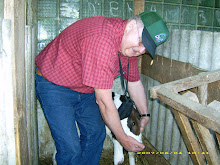
At the present time long maturity varieties are grown in the region, however it is recommended that newer genetics that mature up to one month earlier will use less water without sacrificing yield.

The corn is harvested when the dry matter of the total plant is near 33 percent and is chopped with modern equipment. The silage is trucked a short distance to the horizontal silo where it is packed tightly and allowed to ferment rapidly to preserve high nutrient quality.

After the silage has fermented at least 45 days it is then removed from storage and is placed into a stationary baler where it is shaped into a large bale.
 Silage will spoil quickly if allowed to remain in contact with air, so the baling operation is done rapidly.
Silage will spoil quickly if allowed to remain in contact with air, so the baling operation is done rapidly.
An operator contols the hydraulic pressure applied to the bale as it is being formed. Once it reaches desired size a net wrap coveres the bale.
 The baler is stationary and powered by electricity.
The baler is stationary and powered by electricity.
Once the net wrapped bale moves onto the finishing platform a plastic film is stretched over the bale as it is rotated in position allowing at least two and a half wraps to cover the bale insuring a tight wrap which preserves the bale for up to one year.





1 comment:
A good information you share here! I really like and enjoy the post. Grainbag is useful for grain storage.
Post a Comment